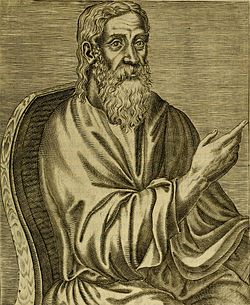Clement of Alexandria Quote
Those who have castrated themselves from all sin for the sake of the kingdom of heaven, are blessed; they abstain from the world.
Clement of Alexandria
Those who have castrated themselves from all sin for the sake of the kingdom of heaven, are blessed; they abstain from the world.
Tags:
sin
Related Quotes
Perhaps it is true that, by some definitions, Satan is more religious than God. Many of the particularly proud sinners are deceived into thinking that Satan is anti-religious, that he likes seeing peo...
Criss Jami
Tags:
accusation, accuser, anti religious, apologetics, blame, deception, devil, evil, father of lies, fault
About Clement of Alexandria
Titus Flavius Clemens, also known as Clement of Alexandria (Ancient Greek: Κλήμης ὁ Ἀλεξανδρεύς; c. 150 – c. 215 AD), was a Christian theologian and philosopher who taught at the Catechetical School of Alexandria. Among his pupils were Origen and Alexander of Jerusalem. A convert to Christianity, he was an educated man who was familiar with classical Greek philosophy and literature. As his three major works demonstrate, Clement was influenced by Hellenistic philosophy to a greater extent than any other Christian thinker of his time, and in particular, by Plato and the Stoics. His secret works, which exist only in fragments, suggest that he was familiar with pre-Christian Jewish esotericism and Gnosticism as well. In one of his works he argued that Greek philosophy had its origin among non-Greeks, claiming that both Plato and Pythagoras were taught by Egyptian scholars.
Clement is usually regarded as a Church Father. He is venerated as a saint in Coptic Christianity, Eastern Catholicism, Ethiopian Christianity, and Anglicanism. He was revered in Western Catholicism until 1586, when his name was removed from the Roman Martyrology by Pope Sixtus V on the advice of Baronius. The Eastern Orthodox Church officially stopped any veneration of Clement of Alexandria in the 10th century. Nonetheless, he is still sometimes referred to as "Saint Clement of Alexandria" by both Eastern Orthodox and Catholic authors.
Clement is usually regarded as a Church Father. He is venerated as a saint in Coptic Christianity, Eastern Catholicism, Ethiopian Christianity, and Anglicanism. He was revered in Western Catholicism until 1586, when his name was removed from the Roman Martyrology by Pope Sixtus V on the advice of Baronius. The Eastern Orthodox Church officially stopped any veneration of Clement of Alexandria in the 10th century. Nonetheless, he is still sometimes referred to as "Saint Clement of Alexandria" by both Eastern Orthodox and Catholic authors.
